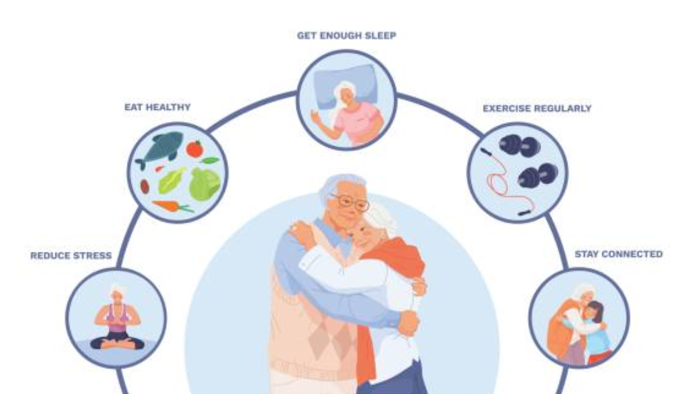Helping parents age gracefully: All about gapping the bridge between dependency and care giving
In Indian tradition, there is no deed bigger than taking care of one's own parents. The cycle of life of an individual includes old age where the involvement of children is mostly sought. However, societal, economic, and cultural dynamics have reshaped the traditional caregiver role of children. Apart from these reasons, one of the most crucial factors is the inability of children in understanding old age properly. As parents age, families often face a period of transition that requires emotional, practical, and sometimes financial adjustments. This phase can be both challenging and rewarding, marked by various considerations and responsibilities.
Aging parents and their children mostly experience role reversal or shifts in dynamics. Adult children may find themselves taking on more caregiving responsibilities, which is emotionally taxing. It's common for families to navigate feelings of concern, guilt, or even resentment amidst the desire to provide the best care possible.
Taking care of aging parents is a responsibility that requires compassion, patience, and a proactive approach to address their evolving needs and well-being. As parents age, they may experience physical, emotional, and cognitive changes that necessitate supportive care and attention from their loved ones. Maintaining open and frequent communication with aging parents is crucial. Understanding their preferences, concerns, and health conditions allows caregivers to tailor their support accordingly.
Do not make assumptions, involve them in decisions about their care
Neglecting to involve aging parents in decisions about their care is a significant oversight that can undermine their autonomy, dignity, and overall well-being. This mistake often arises from well-meaning intentions to protect or oversee their welfare, but it can have detrimental effects on their sense of agency and quality of life.

Helping parents age gracefully: All about gapping the bridge between dependency and care giving
Involving aging parents in decisions about their care respects their fundamental right to self-determination. As individuals age, they may experience physical and cognitive changes that require adjustments in their daily routines, medical treatments, or living arrangements. Consulting them on these matters ensures that their preferences, values, and concerns are considered, promoting a sense of control over their lives. Exclusion from decision-making can lead to feelings of helplessness, frustration, or resentment in aging parents. They may perceive decisions made on their behalf as paternalistic or dismissive of their insights and desires. This can strain relationships and erode trust between caregivers and parents, complicating future interactions and cooperation.
Involving aging parents in decisions fosters transparency and mutual understanding. It encourages open communication about their health status, treatment options, and long-term care plans. This shared information enables aging parents to make informed choices aligned with their goals and values, enhancing their satisfaction with the care they receive. Excluding aging parents from decision-making overlooks their unique perspectives and life experiences. They possess valuable insights into their own preferences, habits, and routines accumulated over a lifetime. Ignoring these insights may result in care plans that are impractical, uncomfortable, or incompatible with their lifestyles, diminishing their overall quality of life.
Participation in decision-making empowers aging parents to advocate for their needs and preferences within the healthcare system. It encourages them to voice concerns, ask questions, and assert their rights to receive respectful and person-centered care. This advocacy can lead to better outcomes in terms of medical treatments, emotional support, and overall well-being.
Seek support
Failing to seek professional guidance and support while taking care of aging parents can be a critical mistake that caregivers often overlook. This error can stem from various factors, including misconceptions about caregiving responsibilities, reluctance to admit limitations, or underestimation of the complexities involved in elder care. Caregiving for aging parents often begins with good intentions and a sense of familial duty. Many adult children take on caregiving roles without prior experience or training, assuming they can manage their parents' needs effectively on their own. However, the reality of caregiving can quickly become overwhelming, especially as parents' health declines or complex medical conditions arise.

Ignoring the need for professional guidance can lead to suboptimal care for aging parents. Caregivers may struggle with medication management, wound care, mobility issues, or behavioral changes without appropriate training or knowledge. This can result in medical errors, ineffective treatment plans, or delays in accessing necessary healthcare services, compromising the quality of care provided to parents.
Another consequence of neglecting professional guidance is the potential strain on family dynamics and relationships. Caregiving responsibilities can create tension among siblings or between spouses, especially when decisions about parental care and financial matters are involved. Professional mediators or counselors can facilitate family discussions, provide objective advice, and help navigate disagreements to ensure that caregiving responsibilities are shared equitably and harmoniously.
Failing to seek professional guidance may result in missed opportunities to optimize parents' quality of life and independence. Geriatric specialists can assess parents' functional abilities, cognitive health, and overall well-being to develop personalized care plans that enhance their autonomy and dignity. Accessing community resources such as home health services, adult day programs, or support groups can also provide social engagement and meaningful activities for aging parents.
Legal and financial planning is another area where professional guidance is essential. Many caregivers delay or overlook important tasks such as drafting advance directives, establishing power of attorney, or navigating long-term care insurance policies. Consulting with elder law attorneys, financial advisors, or estate planners can ensure that parents' legal and financial affairs are in order, minimizing future complications and protecting their assets.
Do not ignore long term planning
Not planning for the long-term while taking care of aging parents is a common oversight that can have significant implications for both the caregivers and their parents. Caregiving often begins as a response to immediate needs or crises, such as a sudden decline in health or an unexpected medical emergency. While addressing these urgent issues is essential, failing to consider long-term planning can lead to challenges and hardships down the road.
One of the primary consequences of not planning for the long-term is the lack of preparedness for future caregiving needs. Aging is a progressive process, and health conditions can deteriorate over time. Without a long-term plan in place, caregivers may find themselves unprepared to manage increasing care needs, complex medical conditions, or unexpected changes in their parents' health status. This can result in increased stress, financial strain, and difficulty in accessing appropriate care resources when needed.
Financial planning is another critical aspect often overlooked in caregiving. Many caregivers underestimate the costs associated with long-term care, medical expenses, and daily living needs for aging parents. Without a financial plan, caregivers may struggle to afford necessary medications, home modifications, or professional caregiving services, potentially jeopardizing their own financial stability in the process.
Long-term planning includes considerations for housing and living arrangements. As parents age, their ability to live independently may diminish, requiring adjustments to their living environment or relocation to a more supportive setting. Caregivers should discuss housing options with their parents, such as aging in place with home modifications, moving to an assisted living facility. Planning ahead allows families to make informed decisions based on parents' preferences, health needs, and financial resources.
Social and emotional planning is often overlooked but equally essential in long-term caregiving. Aging can impact parents' social connections, mental health, and overall well-being. Caregivers should consider ways to promote social engagement, leisure activities, and emotional support for their parents as they age. This may involve connecting parents with community resources, senior centers, or support groups to combat isolation and enhance quality of life.
Keep other family members, siblings especially in loop
Neglecting effective communication with other family members or siblings regarding the care of aging parents can indeed lead to misunderstandings, conflicts, and ultimately, challenges in providing the best possible care. Clear and open communication is crucial in navigating the complexities of caregiving responsibilities, ensuring equitable distribution of tasks, and fostering a supportive environment for both aging parents and caregivers alike.
One of the primary consequences of poor communication among family members is the emergence of misunderstandings regarding the needs and preferences of aging parents. Each family member may have their own perspective on what constitutes appropriate care, leading to disagreements about medical decisions, living arrangements, financial management, and overall caregiving approaches. Without effective communication, these differing opinions can escalate into conflicts, hindering collaborative decision-making and potentially compromising the well-being of aging parents.

Effective communication is also essential for addressing financial concerns related to caregiving. Discussions about expenses for medical care, home modifications, assisted living facilities, and other caregiving expenses should involve all relevant family members to ensure transparency and shared financial responsibility. Without clear communication, disagreements over financial contributions can arise, potentially straining familial relationships and causing additional stress during an already challenging time.
Initiate open and regular discussions among family members about aging parents' current and future care needs. Create opportunities for everyone to share their perspectives, concerns, and preferences regarding caregiving roles and responsibilities. Establishing a collaborative approach from the outset can help prevent misunderstandings and promote a shared understanding of caregiving priorities.
Maintain transparency regarding financial matters related to caregiving. Discuss budgetary considerations, financial contributions, and potential costs associated with medical care and other caregiving expenses. Establishing a financial plan that outlines shared responsibilities and contributions can minimize conflicts and promote financial accountability among family members. Respect each family member's unique strengths, limitations, and availability when assigning caregiving tasks. Recognize that caregiving responsibilities may need to be adjusted over time based on evolving circumstances and changing needs. Flexibility and willingness to adapt to new challenges can help prevent resentment and foster a sense of teamwork among siblings and extended family members. Prioritize empathy, patience, and compassion in all communication efforts.
Understanding financial implications of caregiving
Underestimating the financial implications of caregiving for aging parents is a common oversight that can have significant consequences for both caregivers and their families. Caregiving often entails various expenses that can accumulate over time, impacting not only the financial stability of caregivers but also their overall well-being and quality of life.
Many caregivers underestimate the direct costs associated with providing care for aging parents. These costs can include medical expenses such as doctor visits, medications, medical equipment, and home modifications to accommodate aging-related needs. There may be costs for hiring professional caregivers or home health aides if full-time care is required. These expenses can quickly add up, especially if aging parents have complex medical conditions that require ongoing treatment and supervision.
Caregivers often overlook the indirect costs of caregiving, such as lost wages and reduced work hours. Many caregivers need to take time off work or even leave their jobs entirely to provide adequate care for their aging parents. This loss of income can significantly impact their financial stability, leading to decreased savings, retirement funds, and long-term financial security. Moreover, caregivers may face challenges in re-entering the workforce or advancing their careers after an extended period of caregiving.
Caregivers may underestimate the long-term financial impact of caregiving on their own retirement plans and future financial goals. Providing care for aging parents often requires caregivers to dip into their savings or retirement funds to cover immediate expenses. This can jeopardize their own financial security later in life, making it difficult to save adequately for retirement or other major life milestones.
Including assessing both direct and indirect costs of caregiving, understanding the impact on their own financial stability and future goals, and implementing strategies to mitigate financial risks. Seeking professional financial advice and exploring available resources and support services can help caregivers navigate the complex financial challenges of caregiving and ensure that aging parents receive the best possible care while safeguarding their own financial well-being. By recognizing the true costs of caregiving and planning accordingly, caregivers can make informed decisions that promote financial security and enhance overall quality of life for themselves and their aging parents.
Do not neglect yourself
Overlooking one's own well-being while caring for aging parents is a critical mistake that many caregivers unwittingly make. While the intentions behind caregiving are often rooted in love, duty, and responsibility, neglecting personal health and self-care can have significant consequences for both the caregiver and the quality of care provided to the parents.
Caregiving is inherently demanding, requiring physical, emotional, and sometimes financial sacrifices. Many caregivers prioritize the needs of their aging parents above their own, often neglecting their own health and self-care routines in the process. This selflessness can lead to physical exhaustion, chronic stress, and burnout over time. Caregivers may experience disrupted sleep patterns, poor nutrition, and neglect of regular medical check-ups, which can exacerbate existing health conditions or lead to new ones. Emotionally, caregivers may experience heightened levels of anxiety, guilt, and frustration. They may suppress their own feelings and need to focus solely on the needs of their parents, leading to emotional exhaustion and a sense of isolation. Over time, this can strain relationships with family members, friends, and even the aging parents themselves, as caregivers struggle to balance their caregiving role with other aspects of their lives.
Caregivers often underestimate the long-term nature of their responsibilities. Caring for aging parents can extend over many years, even decades, particularly as parents' health declines with age. This prolonged commitment can lead to a sense of being trapped or overwhelmed, as caregivers struggle to find respite or time for personal pursuits outside of caregiving responsibilities.
The societal expectations and cultural norms surrounding caregiving can also contribute to caregivers neglecting their own well-being. There is often an unspoken expectation that caregivers should prioritize the needs of their parents above all else, sometimes at the expense of their own physical and mental health. This pressure can lead caregivers to feel guilty or ashamed if they consider their own needs or seek support from others.
The consequences of neglecting one's own well-being while caregiving can be profound. Caregiver burnout, characterized by physical and emotional exhaustion, detachment, and a sense of hopelessness, is a common outcome. Burnout can impair caregivers' ability to provide effective care, leading to increased risks for medical errors, neglect of parents' needs, and strained relationships. Caregivers may experience heightened levels of depression, anxiety, and stress-related health problems. Chronic stress can weaken the immune system, increase susceptibility to illnesses, and exacerbate pre-existing health conditions. Over time, caregivers may find themselves in a cycle of declining health and reduced quality of life, which can have lasting repercussions.
To mitigate these risks and prioritize their own well-being, caregivers must recognize the importance of self-care and seek support from others. It is essential for caregivers to establish realistic expectations, set boundaries, and allocate time for rest, relaxation, and activities that bring them joy. Seeking respite care, joining support groups, and accessing community resources can provide caregivers with the assistance and encouragement they need to maintain their own health and well-being.
